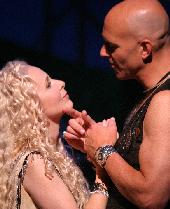SEARCH CurtainUp
REVIEWS
FEATURES
NEWS (Etcetera)
ADDRESS BOOKS
Broadway
Off-Broadway
BOOKS and CDs
OTHER PLACES
Berkshires
London
Los Angeles
Philadelphia
Elsewhere
QUOTES
TKTS
LETTERS TO EDITOR
FILM
LINKS
MISCELLANEOUS
Free Updates
Masthead
NYC Weather
 Berkshire Review
Berkshire ReviewA Midsummer Night's Dream
By Macey Levin
|
The course of true love never did run true---
Lysander
|

Kate Burton as Titania & John Bedford Lloyd as Oberon
(Photo: Richard Feldman) |
In an interview included in the program, director Nicholas Martin states that he wanted to find a way to commemorate the departure of WTF Artistic Director Michael Ritchie (who is leaving for Los Angeles*) and the Adams Memorial Playhouse, which will be replaced by a new theatre next year. Both are commendable aspirations, but the sentiment robs the play of those elements that make it an enchanting and enduring classic. The production has some strengths, but it is not the play Shakespeare penned.
As the audience enters, it is confronted by a large scrim on which is a road sign reading "Entering Williamstown." When the curtain rises a cartoon-like drawing of the Adams spans the stage. Immediately, then, the play's basic tone is compromised. Later a Dunkin' Donuts sign and props are wheeled on for no apparent reason other than to maintain the contemporary setting of the production's misguided concept. What should be delicate and sensitive becomes hokey.
When we enter the woodland, Alexander Dodge's set eschews trees for industrial structures recalling the construction of WTF's partially completed new theatre next door. The mystery and mysticism of the forest becomes harsh and ugly. As the characters, except for the mechanicals, enter the forest, their costumes all become white, suggesting some kind of obscure symbolic statement. The costumes are also of mixed eras. Continuing to weaken the fantasy, near the end of the show the fairies line up in the audience brandishing fiber-optic gimmicks that look chintzy, not magical or fanciful.
The wayward interpretation also pervades the casting. Though some of the performances are enjoyable, others lack substance and subvert the intent of the play. Jessica Stone and Kathryn Hahn, Hermia and Helena, bring energy to all their scenes. Their suitors Lysander (Dashiell Eaves) and Demetrius (Jon Patrick Walker,) however, are weak foils for the women though they do gain strength in the second act.
Oberon, the fairy king, played by John Bedford Lloyd, looks like a tall Patrick Stewart; however, his commanding presence generates authority little heat between him and Kate Burton's lackluster Titania. They are self-centered but not very lustful. What should be boundless sexual tension is closer to a domestic squabble that could be settled by Dr. Phil.
Christopher Fitzgerald creates a Puck who is almost endearing. He, and others dressed like him in a clever theatrical ploy, darts around the stage in a sometimes sheepish, sometimes mischievous manner. But rather than being imp-like he is corny and silly. He, too, lacks the magic.
As is often the case in Midsummer, the mechanicals steal the show. With the opportunity to be broader than broad and dumber than dumb, actors relish the prospect of playing one of these guys. Lee Wilkof, Sam Breslin Wright, Rod McLachan, Brooks Asmanskas, and Andrea Martin, intentionally poorly disguised as Robin Starveling, join Jeremy Shamos's comical Nick Bottom in being shamelessly goofy. Their Pyramis and Thisbe produces great laughs, though it feels as if it runs on a bit too long, which may be Shakespeare's fault.
David Lansbury as Theseus lacks energy and his delivery sounds rote whether addressed to Hippolyta, played by a cold and stoic Jennifer Van Dyck or one of his subjects. His words, especially in the first scene, blur into each other.
Martin's staging is well-balanced and he creates theatrically interesting stage pictures that are complemented by the atmospheric lighting of Donald Holder. Dodge's sets are a liability to the basic essence of the play, but Martin also has to accept responsibility for their shortcomings.
This is not a terrible production. There is a level of enjoyment that can capture an audience's attention. After all, an acting company has to exert great energy to kill A Midsummer Night's Dream. While this one does not destroy the work, the play has greater value when performed as that English fellow wrote it.
*See CurtainUp' Interview with Michael Ritchie
Editor's Note: Interestingly, Shakespeare & Company also commemorated major location changes with a production of Midsummer Night's Dream. That one also incorporated an awareness of physical changes (the move from the Edith Wharton Estate to a new Kemble Street home) into the production. However, it was done as a very funny prologue and, perhaps abetted by the fact that the play was done out doors, that concept worked a lot better. The review can be read by clicking here. For links to various other Midsummer Night productions see our Shakespeare page.
| A Midsummer Night's Dream Playwright: William Shakespeare Director: Nicholas Martin Cast: Theseus/ David Lansbury; Egeus/ Jonathan Fried;Lysander/ Dashiell Eaves; Demetrius/Jon Patrick Walker; Philostrate/ John Forest; Peter Quince/ Lee Wilkof; Snug/ Sam Breslin Wright; Nick Bottom/ Jeremy Shamos; Tom Snou/ Rod McLachan; Robin Starveling/ Andrea Martin; Francis Flute/ Brooks Ashmanskas; Hippolyta/ Jennifer Van Dyck; Hermia/ Jessica Stone; Helena/ Kathryn Hahn; Oberon/ John Bedford Lloyd; Titania/ Kate Burton; Puck/ Christopher Fitzgerald; Peaseblossom/ Kelly McCreary; Cobweb/ Reginald Veneziano; Moth/ Erin McMonagle; Mustardseed/ Morgan Ritchie; Oberon's Attendant/ Louis Ozawa Changchein Fairies: Kate Berton, Lauren Blumenfeld, Lee Briggs, Morgan Cox, Benjamin Curley, Craig De Lorenzo, Alexander Demers, Katherine Emmer, Genevieve Gearhart, Susan Goodwillie, Sachi Grandoit, Rachel Handshaw, Michael Hoagland, Erik Kaiko, Matt Kenney, Charlotte Ritchie, Greg Roman, Erin Salm, Emily Simones, Ben Sinclair, Amos Wolff, Reema Zaman Sound: Jerry Yager Sets: Alexander Dodge Composer: Michael Friedman Costumes: Michael Krass Lighting: Donald Holder Running Time: Two hours, 30 minutes, includes one intermission Williamstown Theatre Festival, Adams Memorial Theatre, 1000 Main Street, Williamstown, MA (413/597-3400) web address July 14 - 25, 2004 |



Retold by Tina Packer of Shakespeare & Co.
Click image to buy.
Our Review

Berkshire Hikes &
The Berkshire Book
Great Places to Eat, Shop, Stay
Sheffield Pottery
In Lee:
Morgan House Inn & Restaurant
In Lenox:
Andrew De Vries Sculptures
In Williamstown
Pappa Charlie's Deli
Thai Garden
Listing information: esommer@curtainup.com

6,500 Comparative Phrases including 800 Shakespearean Metaphors by CurtainUp's editor.
Click image to buy.
Go here for details and larger image.


